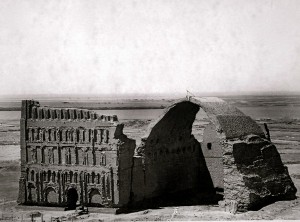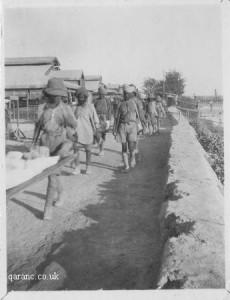The British campaign in Mesopotamia proceeded at a brisk pace through most of 1915. British and Indian troops swept northwards, brushing aside Turkish resistance and advancing confidently towards their ultimate objective: Baghdad. But the Turkish forces were waiting for them in a carefully prepared defensive position, at the ancient town of Ctesiphon, 26 km south of the city. §
The British commander, General Townshend, decided to attack early on the morning of November 22.

The night before the battle, Capt. Kalyan Mukherji wrote a letter to his family:
21-11-15
Ma
Since I last wrote to you we have advanced another 12/13 miles towards Baghdad. The battle will start tomorrow. I’m doing well. I don’t know when you’ll get this letter. We don’t know when the ships will take the next post to the south. I’m writing in the hope that the steamer will take our letters when it carries the wounded down. The post office is on the ship.
Let’s hope the battle will last just a day and that we will reach our destination without difficulty.
Your
Kalyan (347-8)
The British attack on Ctesiphon started the next morning. This is Mokkhoda Debi’s account of the battle:
5. The Turkish soldiery was battle-hardened and brave, and their aims were, in a sense, completely clear. They had settled into the trenches of Ctesiphon and taken the opportunity to rest as they waited for the British attack. They were willing to risk everything for their country, their honour, and for the safety of Baghdad. Their leader, Nuruddin Pasha was an extremely seasoned man, fully the equal of General Tonwshend in education, intelligence and strategic skill. (350-1)
…
9. At 6 a.m. (on the 22nd), the British launched their attack and it continued, like a great storm, for four hours. The Turkish troops matched their fire, bullet for bullet, and succeeded in blocking their advance. (353)
…
12. In this battle Nuruddin Pasha showed that his grasp of strategy was superior to General Townshend’s. He had held many troops in reserve, under the command of General Jevad Bey, to use as a ‘trump’. … At two in the afternoon Jevad Bey’s reserves began to cause great problems for the attackers. It ended with the British gathering their scattered, weary troops and retreating along the same route that they had used for their advance. (354-5)
…
4. It slowly dawned on Townshend now that he had been defeated in the battle of Ctesiphon; no hope of victory remained; there would be no ‘victory-march’ into Baghdad; the best he could hope for was to withdraw his troops safely to the south. (357-8)

On November 25, Kalyan wrote another letter home:
Ma
What happened during the battle of the 22nd cannot be described. I will try to write about it later. On that day I was hit by a bullet, in the elbow. I was lucky that it didn’t hit me anywhere else. The wound was slight. There’s a small hole where it entered. But it isn’t out yet. It lodged itself just before exiting – that’s where it hurts. I didn’t have to go to hospital. If the pain doesn’t stop then I’ll have to get an ‘X-ray’. I had a lucky escape. I hope you’re all well.
Your
Kalyan
(364)
(the page references are to Kalyan Pradeep: Captain Kalyan Kumar Mukhopadhaya, I.M.S.-er Jiboni, by Mokkhoda Debi (Kolkata, 1928) [‘Kalyan Pradeep: The Life of Captain Kalyan Kumar Mukherji, I.M.S.’] The translations are mine).
________________________________
§ Another battle between the dominant European and Asian powers of the day had been fought at Ctesiphon more than fifteen centuries earlier, on May 29, 363 CE. The protagonists were the Sassanid King Shapur II and the Roman Emperor Julian (who is the subject of a wonderful novel by the recently deceased and greatly lamented Gore Vidal).

Loved that image of Khosrow palace!
I wonder if there was a parsi at that battle… it would be quite an experience for him – to fight a battle against a force – turkish, from an indian side – which was not his origin country – on behalf of the English… european in a sense…
The irony wouldn’t have been lost on him i’m sure, and would make a great novel of humor and circumstance!
Yes, since the main body of the force consisted of the 6th Poona Division there were some Parsis, also medical auxiliaries. They are mentioned in ‘Abhi Le Baghdad’, the next book I am writing about.
best
Amitav
my great grandfather lost his life on 22.11.1915 their.. he was subedar at that time. do you have more information about this war. please inform